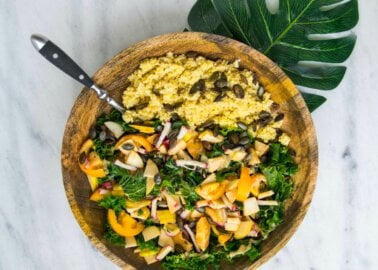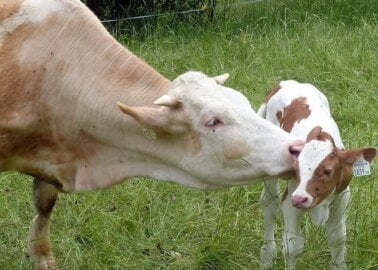The Ultimate Guide to Vitamin B12
If you’re newly vegan or trying to cut down your meat intake, you’ve probably heard something or other about vitamin B12 – and for good reason! This small but mighty vitamin has a big impact on our bodies and our brains, whether we’re vegan or not.
For good health, B12 has to be part of our nutritional intake – but how we can get it is often misunderstood, and as a result, there are many myths around the vitamin. So, what exactly is it? Where can we get it from? What foods with B12 should vegan eating include?

What Is Vitamin B12?
Vitamin B12 is essential for our physical and mental health because it’s involved in many vital processes. It aids us in producing red blood cells, creating DNA and RNA, maintaining a healthy nervous system, and releasing energy from food. A deficiency can lead to serious problems, such as anaemia and damage to the nervous system.
How Much Vitamin B12 Do I Need?
For people over the age of 14, the recommended daily intake of B12 is 2.4 micrograms – the amount found in one to two tablespoons of fortified nutritional yeast. If you have any concerns, or have pre-existing health conditions that may affect your recommended intake, we urge you to ask your doctor what dosage might work best for you.
Is B12 More Important for Vegans?
B12 is important for everyone – and you don’t need to eat meat or other animal “products” in order to get it. The vitamin is often associated with eating meat because certain microorganisms – such as bacteria and archaea – eaten by herbivore animals produce B12 after being passed in an animal’s digestive systems. But in fact, animals on farms are fed vitamin B12 supplements. In contrast to the myths perpetuated by the meat industry, we absolutely do not need to raise, give supplements to, cage, and slaughter animals and eat their flesh to get vitamin B12. Getting the vitamin from supplements or fortified vegan foods directly is a kinder and much simpler option.
In fact, health risks associated with meat-eating highlight just how absurd it is to think that eating an animal’s corpse benefits us in any way. Research shows that balanced vegan meals are far healthier for us.

Consuming animals, their eggs, or their mammary secretions means taking in high levels of cholesterol and saturated fat, which build up in the body, clog arteries, and stop the heart from working properly. Eating just two servings of meat a week will increase your risk of suffering from heart disease.
Cholesterol is found only in animal-derived foods – so a plant-based diet is 100% cholesterol-free, while its high fibre content helps wash away excess fatty substances in the body.
Our flesh fetish also has an enormous environmental impact which harms not only our planet but also the health of everyone who lives on it.
You can get all the nutrients you need from a healthy, balanced vegan diet rich in wholefoods including fruits, vegetables, pulses, grains, nuts, and seeds. Several studies have reported that people who eat vegan tend to consume more fibre, antioxidants, potassium, magnesium, folate, and vitamins A, C, and E.
How Can Vegans Get Enough Vitamin B12?
Vitamin B12 actually used to occur naturally on the surface of potatoes, beetroot, and other root vegetables, but the move away from natural fertilisers has caused it to disappear from our soil.
These days, you can get B12 from vegan sources that have been fortified with it, such as cereals, non-dairy milks, non-dairy yogurt, bread, Marmite, vegan meats, and fortified nutritional yeast – a delicious, flaky superfood that tastes like cheese and can be added to many dishes. Remember to check the label to be sure the foods you’re buying are fortified with vitamin B12.
You can also get all the B12 you need from a vegan liquid or pill-based supplement. If you’re concerned that you may not be getting enough, ask your doctor to check by running a blood test.
Time to Get Cooking
Now that you know the deal with vegan eating and Vitamin B12, it’s time to get those nutrients in! Check out PETA’s recipe page for some inspiration on vegan meals, or start with the below – you can easily add two tablespoons of fortified nutritional yeast to these recipes and get your daily B12 intake:
Do You Have More Questions About Vegan Eating?
Order PETA’s Free Vegan Starter Kit for more information, tips, and vegan recipes.




